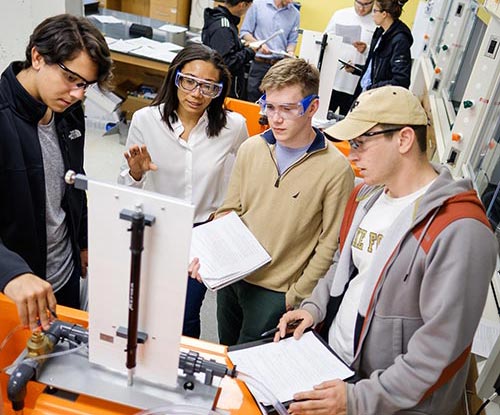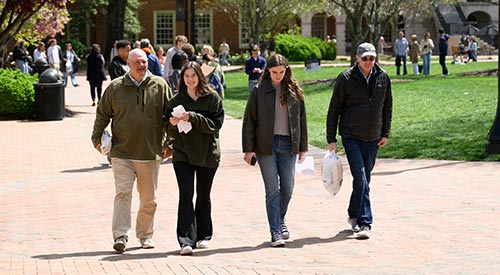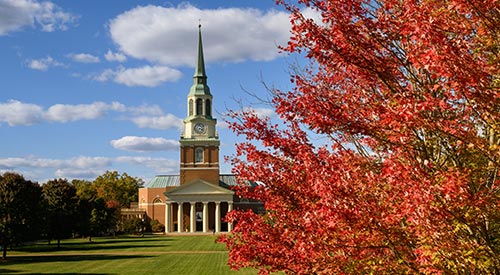Computer Science

Computer Science Degree
Bachelor of Science, Bachelor of Arts, Minor
Program Type:
Major, Minor
Career Path:
STEM (Technology, Engineering)
Program Site:
College or School:
Why study Computer Science?
Computer Science deals with the logical and mathematical foundations of computing, techniques for solving problems with computer programs, and the technical underpinnings of computer hardware and networks.
- As one of the first American universities to recognize the necessity of a laptop computer for every student, Wake Forest has been out front in a discipline that never stops updating itself. Computer Science students can engage in 10 distinct areas of the field, including mobile computing; computing for people with disabilities; computational biophysics; and big data.
- Recent student research projects have developed and deployed mobile apps for a wide range of public benefits, including assistive and rehabilitative therapy; real-time vehicle tracking; and geotrekking.
- Student teams participate in several unique intercollegiate competitions each year.
- The department offers a fellowship that rewards entrepreneurship.
- Computer Science is the fastest growing major at Wake Forest, having grown from 18 total declarations in 2015 to 59 in 2025. That’s a 228% growth rate.
The Computer Science degree is offered as a Bachelor of Science (B.S.), Bachelor of Arts (B.A.), and a minor.
What classes would I take?
Our model and curriculum educate the whole person and often help students discover interests they had never previously discovered. Students generally take 100-200 level courses during their first year of college, while registering for higher level courses as upperclassmen.
Sample courses* that you may take as a Computer Science student include:
100-200 level
- Introduction to Web and Mobile Applications
- Fundamentals of Computer Science
- STEM Incubator
- Data Structures and Algorithms
- Computer Systems
300 level
- Database Management Systems
- Software Engineering
- Mobile and Pervasive Computing
- Computer Security
- Artificial Intelligence
* Course availability and offerings can change at any time. Refer to the Academic Bulletin to view all major requirements.
What kind of experience will I gain?
If you’re a computer science major, you live in a world of acronyms: HTML, TCP/IP, MS, IT, OS—and the list changes constantly. Keeping up with new technologies might seem daunting, but luckily for you, students with computer savvy are in high demand in a variety of different fields.
Whether you have stellar programming skills, networking know-how, or have just designed your own web page, it’s important to complement your computer science major with an internship.
Students in this program will develop the following skills:
- Ability to trace problems to their sources
- Analyzing communication situations
- Skilled at clarifying problems or situations
- Systematizing/organizing material
- Organizing/classifying data
- Able to anticipate and diagnose problems
- Perceiving/defining cause and effect relationships
- Decision-making
- Proficiency for accuracy and detail
- Ability to work under pressure
Are there extracurricular activities?
Joining a club or organization is a great way to get involved and do more with your major. Our Computer Science students participate in the following programs:
- Association of Computing Machinery (ACM) Computer Student Chapter
- UPE (North Carolina, Epsilon Chapter)
- Women in Computer Science
- WFU Robotics Club
What kind of job can I get?
Careers that often interest Computer Science majors, and fields our graduates work in, include:
- Analyst
- Applications Research Programmer
- Application Specialist
- Consultant
- Computer Systems/Software Sales Representative
- Cybersecurity
- Data Processing Manager
- Database Administrator
- Educator
- Engineer
- Network Manager
- Programmer
- Project Manager
- Software Engineer
- Systems Administrator
- Systems Engineer
- Technician
Recent graduates have worked as data analysts in the U.S. military; app developers in banking; financial consultants; and cyber security engineers, among other professions.
Related Programs

Majors & Minors
Choose from more than 50 majors and over 60 minors to find your perfect fit.

Life at Wake
Take a moment to explore all the student experiences that make Wake Forest unique.

Virtual Tour
Can’t make it for a visit? No problem! Let us show you around campus virtually.

Keep in Touch
Let us know you’re interested in Wake Forest and we’ll do the rest.

Visit Campus
You truly can’t appreciate the beauty of our campus until you experience it for yourself.

Apply
Want to be considered for our next class of Demon Deacons? Here’s how to get started.
